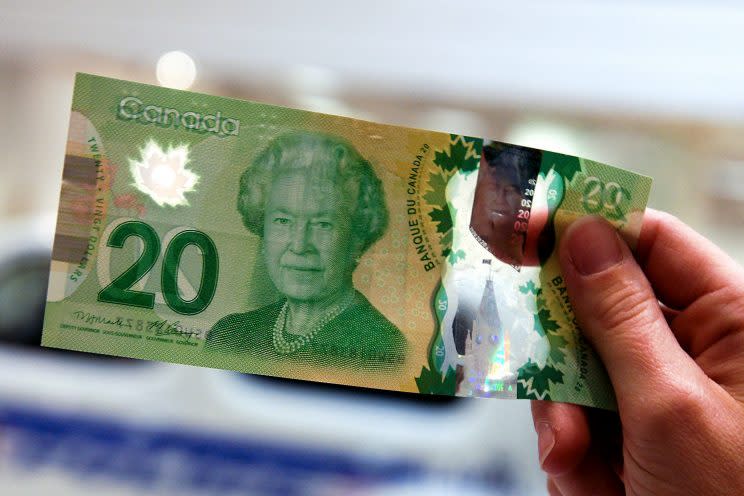Sorry, vegans, there's animal fat in Canada's bucks

It’s official, the U.K. isn’t the only country with beef in its bucks, Canadian money also uses trace amounts of animal fat in the manufacturing of its polymer bills.
The Bank of Canada confirmed yesterday via Innovia Security, the supplier of polymer substrate used as a base of Canadian banknotes, that our money contains additives produced from tallow – a substance made from rendered animal fat.
“These additives help with the polymer manufacturing process, similar to many commercially available plastics materials,” Bank of Canada spokesperson Josianne Ménard told Yahoo Canada Finance. “These additives would represent substantially less than one per cent of the total weight of the substrate.”
While the amount of tallow in the bills themselves is rather marginal, the Bank of Canada estimates that 80 per cent of the Canadian banknotes in circulation are polymer. In the U.K., the discovery of the use of tallow has ignited furor from the vegan community and others who don’t eat meat for religious or ethical reasons.
A petition calling on the country’s central bank to remove tallow from the banknote manufacturing process has garnered over 100,000 signatures.
“The new £5 notes contain animal fat in the form of tallow. This is unacceptable to millions of vegans, vegetarians, Hindus, Sikhs, Jains and others in the U.K. We demand that you cease to use animal products in the production of currency that we have to use,” says the petition, launched by Doug Maw.
In an opinion piece for iNews Maw wrote: “Putting animal products into our bank notes gives us no choice in whether we use it. This manufacturing decision by the Bank of England is short sighted, offensive and needs to be changed.”
He points out that while he doesn’t expect the notes already in circulation to be scrapped he does expect the Bank of England to cease production using animal products.
“There are numerous alternatives that can be used. In the meantime I will be refusing to accept any of the new notes. I encourage you to do likewise,” he says.
Canada released its polymer bills in November 2011, starting with the $100 and adding the $50, $20, $10 and $5 notes into circulation over the next few years.
But Canada and the U.K. aren’t the only countries using Innovia’s Guardian polymer banknote substrate. According to the company, 24 countries worldwide use the product in 80 denominations including Australia (since 1988) Mexico (since 2002) and more recently New Zealand, Nicaragua and Singapore.
Tallow, which is made from the kidney and loins of cows, sheep and horses, is also used in candles and soap. Innovia told CNN Money that they worked with a supplier who used the product to make their material more anti-static and would never “knowingly add any animal ingredients” to their products.
“(The supplier is) looking to eliminate that, but obviously that will take time,” Patricia Potts, a spokesperson for Innovia told CNN. “It’s a very difficult process.”

 Yahoo Finance
Yahoo Finance 